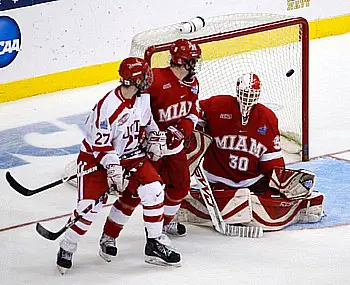As the consensus number one team in the country, Boston University was expected to win the NCAA championship. The Terriers had claimed six titles already this year: the NCAA Northeast Regional, the Hockey East tournament, the Hockey East regular season, the Beanpot, the Denver Cup, and the Ice Breaker. They were the odds-on favorite to add a seventh — the one that really matters, an NCAA championship.
The Terriers’ talent-laden roster had prompted one Hockey East coach to refer to them as “the only professional team playing college hockey.” Their destruction of Ohio State, 8-3, in the opening round of the NCAAs only confirmed that claim.

Instead, it was the last time anything was easy for them.
To get out of the Northeast Regional, the Terriers had to get past a New Hampshire club that arguably outplayed them until a Jason Lawrence goal with 15 seconds in regulation gave BU a heart-thumping 2-1 win.
“That’ll be their toughest test,” this writer began to tell people. “Just like Boston College last year over Miami.” BC had needed overtime to get past Miami in the regionals, but took the national title with far less drama, defeating North Dakota, 6-1, and then Notre Dame, 4-1.
It stood to reason that BU would replay that script this year. After all, by the start of the Frozen Four, the Terriers had posted a 19-1-3 record in their last 23 games. They’d outscored their opponents two-to-one, a product of the nation’s top offense and third-best defense.
By contrast, all the other top seeds had fallen by the wayside, leaving BU and a trio of underdogs. A fifth national championship wasn’t guaranteed for BU — hockey doesn’t work that way — but it seemed highly likely.
So much for that analysis.
In the semifinals, BU trailed Vermont, 4-3, with seven minutes remaining but rallied behind Chris Higgins and Colin Wilson goals.
That comeback, however, was chump change in the drama department compared to the championship game.
The game stood tied, 1-1, entering the third period, but disaster struck for BU when Miami not only scored at 12:31 but again at 15:52 to take a 3-1 lead.
Needing the most miraculous of comebacks, BU coach Jack Parker pulled goaltender Kieran Millan with 3:32 remaining.
But the seconds flew by without BU’s extra-attacker pressure producing results. The seconds turned into a minute and then two. The dreams of a national championship were slipping away.
Not only hadn’t it been easy, it didn’t look like it was going to happen at all. BU players could look at the clock and see the 3-1 deficit still there as the seconds ticked down to just a minute remaining.
“That was not a good feeling,” Higgins said. “Obviously I have so much confidence in the guys, but at the same time when you’re down two goals in the national championship game with so little time left, it’s almost impossible to come back.
“But we kept our cool and never stopped believing.”
Zach Cohen scored from in front with 59 seconds remaining to get BU within one and then Matt Gilroy’s great feed to Nick Bonino resulted in the tying goal at 19:43, sending the BU fan contingent into delirium and their Miami counterparts into stunned shock.
“After we came back into the locker room, we knew this was our time,” Higgins said.
Even so, Miami had some excellent chances in overtime before Colby Cohen’s shot deflected off a RedHawk defender and into the net. The Terriers had earned their fifth national championship, but they’d done it the hard way.
“What a finish!” Parker said. “It’s the greatest comeback I’ve ever been involved in. We won that game because big-time players made big-time plays.”
For Gilroy, the difficulty of the journey made it all the sweeter to savor.
“The way we did it may have given Coach a heart attack, but I wouldn’t want it any other way,” Gilroy said. “The dramatics of it — I’m still in awe of it. It’s something you’ll never forget.”
“To be honest, I still can’t believe it happened.”
It was a 10.0 on the drama scale; it sure wasn’t easy.
“The history of this tournament is such that the teams that are supposed to win this tournament most of the time don’t,” Parker said. “They think they had a great year, they’re the number one team, but the teams that play great in March and April are the ones that win this tournament. Sometimes the best team doesn’t win.
“People don’t understand, unless you’re in the trenches, how difficult it is to win the national championship.”
They might have a much better appreciation now.


